Parrots from the small parakeet to the macaw have been gaining popularity as pets. But the one question on many minds may be, are parrots loyal?
The answer is yes, but with a caveat.
Parrots can be tamed; however, they should not be considered domesticated. Even hand-raised parrots still retain their instincts and tendencies as their wild "cousins."
Parrots can also show true feelings and emotions to their pet parent, some species can even be empathic, but it will take some work to get there - this type of pet can be a challenge!
In this post, we will delve into the true nature of the parrot species to reveal what your feathered friend may be feeling towards you. Plus, we'll review the top five most loyal and affectionate pet parrots. Let's get started.
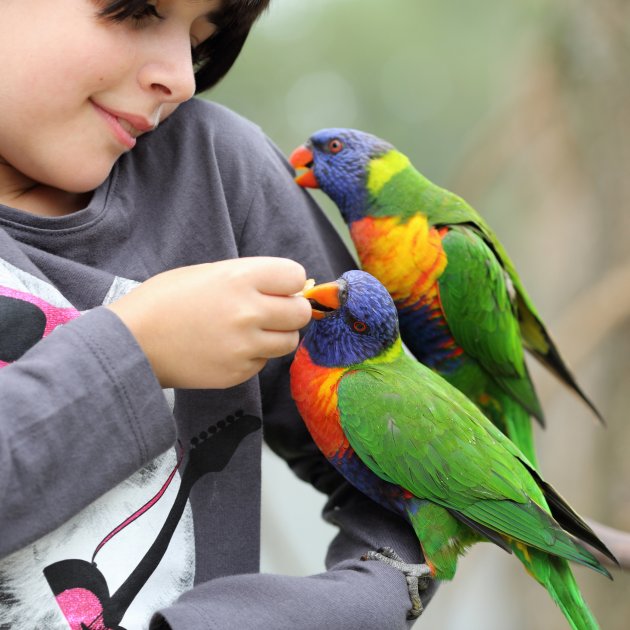
Is it Loyalty or Something Else?
To understand the emotions of a parrot, we must first ask ourselves is "loyal" a fair word to use with our pet parrots?
According to Merriam-Webster, the definition of 'loyal' is "faithful to a private person to whom faithfulness is due, e.g., a loyal husband."
As devoted pet parents, we certainly care for our parrots to the extent where we would expect loyalty to be returned to us for our loving services. But is this species even capable of such a humanized emotion?
In the wild, parrots form flocks, and within that flock, some pair-bonds join together to raise their young. Many species of parrots do mate for life, meaning they choose a partner and will stay monogamous until death do they part. This action would fall under Webster's definition of loyalty.
But what about those parrots that are taken out of their natural habitat and are put into our homes? Will they form the same type of bond with us?
The answer is yes.
Parrots will bond with their humans, but for many species, it is usually one particular person they will favor, and not necessarily the one who is taking care of all their needs. So what emotions are parrots capable of feeling?
Parrots are social and interactive creatures with the capability of showing a range of different types of “human” emotions. According to Bird Supplies.com, your pet parrot can be happy, sad, angry, bored, and a whole host of other feelings that we experience.
The key to understanding your parrot’s emotional state is reading its body language.
- Seeking attention - head bowed, leaning towards you with feathers laid down. Tongue-clicking may also be used to get pet parents affections.
- Annoyed - Purring, ruffled neck feathers, pinning eyes.
- Content - talking, whistling, singing, purring, chattering.
- Angry - ruffled feathers, growling, hissing, perched low staring up at pet parent.
Never force a parrot to be petted or “loved” if it is showing signs of stress, anxiety, fear, or anger. This can result in the bird lashing out, and you could end up with a nasty bite. Leave your feathered friend alone to work out its “mood” and try again later when it has had a chance to calm down. If there’s an apparent reason why your parrot is showing negative emotions, do your best to rectify the situation.
Are Parrots Intuitive?
The parrot species is not only good at exhibiting its emotions, but they are also very intuitive at picking up on their caretaker’s moods. This quality is endearing to the parrot pet parent; however, it is based on instinct.
According to San Diego Zoo, in their natural habitat parrots spend their time in the company of other parrots where they all “keep an eye” on each other. When there is a threat, (whether it is perceived by one or many) the entire flock reacts. This heightened sense of awareness keeps the flock (and each individual) safe.
When we bring a parrot into our home, we become its “flock.” It depends on us for food, water, entertainment, care, love, and protection. In turn, it watches us, listens to us, and learns our behaviors.
Over time, your parrot will know your moods from your body language, tone of voice, and habits and will react accordingly in its own way. If your parrot senses you are sad, it may become more subdued. If you are excited, it may be more animated and bouncy. Watch your parrot to see how he or she is showing you empathy.
The Five Most Loyal and Affectionate Parrots
If you are ready to embark on the adventure of pet parenting this type of animal, here are the top five most loyal and affectionate parrots.
The Cockatoo
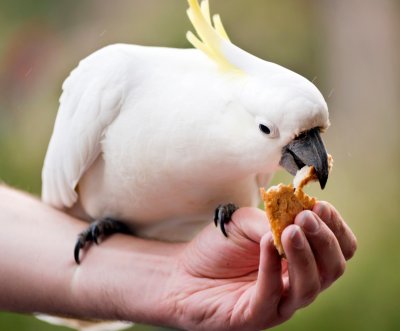
There's a reason why the cockatoo is kept as a pet - it is gorgeous! But aside from its stunning good looks, this bird is comical, personable, intelligent, and even likes to cuddle. Which also means, the cockatoo will be demanding of your time. If deprived of the necessary love it needs, this species of bird can develop compulsive behaviors (like feather plucking and screaming), and may also become depressed.
Depending on the species, cockatoos range in size from 12 to 27 inches and can live from 40 to 80 years!
The Cockatiel
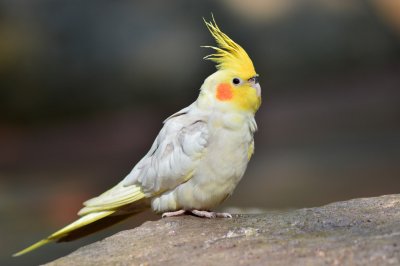
The cockatiel is among one of the most popular pet birds - it's a small parrot with a HUGE personality! This species is native to Australia and is in the Cockatoo family, which explains its similar traits.
The cockatiel is a gentle creature, with a docile temperament; however, it's not particularly cuddly. It does like to be near its pet parent and will be happy to see you and may even greet you with a happy whistle, or head bob. This species is also excellent mimickers and will pick up on those everyday household noises like alarms, telephones, and even outdoor birds.
Cockatiels generally measure around 12 to 13 inches in length and can live up to 20 years old.
The African Grey Parrot
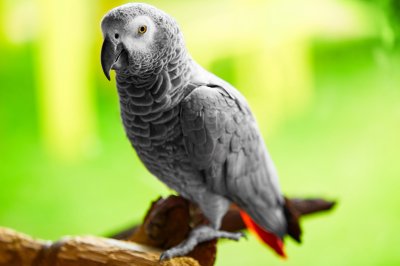
The popularity of this parrot may be because of its intelligence and its ability to talk, which explains why they have been kept as pets for thousands of years. The African grey parrot not only can speak with clarity, but it can also understand what it is saying. In fact, well-trained greys can learn hundreds of words and sounds.
Although it is a very social parrot, cuddling may not be on its short-list of things it likes to do. But that doesn't mean it won't be sweet and affectionate to its favorite human. That's right! Despite attempts to socialize this parrot with all members of the "flock," the African grey tends to pick one person to shower its affections on.
African greys measure up to 13 inches long and can live from 50 to 75 years!
The Parakeet
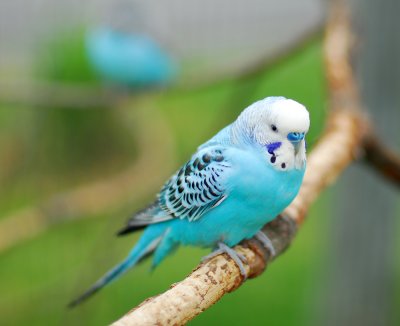
Also known as a "budgie" this smallest member of the parrot family makes an affordable and loving pet. Native to Australia, the parakeet is a docile, gentle bird that is easy to tame. And although it may be tough to understand, this species can also mimic human speech.
If you keep the parakeet in pairs, it may not bond as closely with its human companions, but it will still be a playful and delightful pet, especially for children, seniors, or those in apartments.
Parakeets measure from 7 to 9 inches in length, come in a variety of colors and patterns and can live up to 15 years.
The Macaw
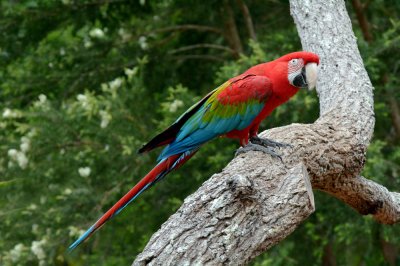
The macaw is a big, bold, bright, and boisterous bird! This South American parrot is playful, active, and needs a lot of space to stay happy and healthy. With the proper nutrition, love, and handling, the macaw is a loyal and affectionate pet. Although they are capable of learning some words, this species will articulate its feelings in other ways - like an ear-piercing scream!
The macaw is a very intelligent bird that can be trained for interactive play, but you will have to start when this parrot is young. Macaws are not for the novice bird parent, as they can become aggressive and problematic in the wrong hands.
This parrot (depending on the species) can grow from 10 inches up to 42 inches long, with a lifespan of 30 to 50 years.
Are Parrots Loyal?
When we choose to pet parent a parrot, we must learn to understand the individual species and bird, so we can have a close connection with it. Remember, we are its flock - even if that is only a flock of two - this animal depends on us for its every need. Let's be good stewards of our parrot's affection, trust, and yes, even loyalty.
Never enter into pet parenting a parrot (even the most affectionate ones) without doing the proper research so that you can ensure you and your new pet will have a long, and lasting relationship.